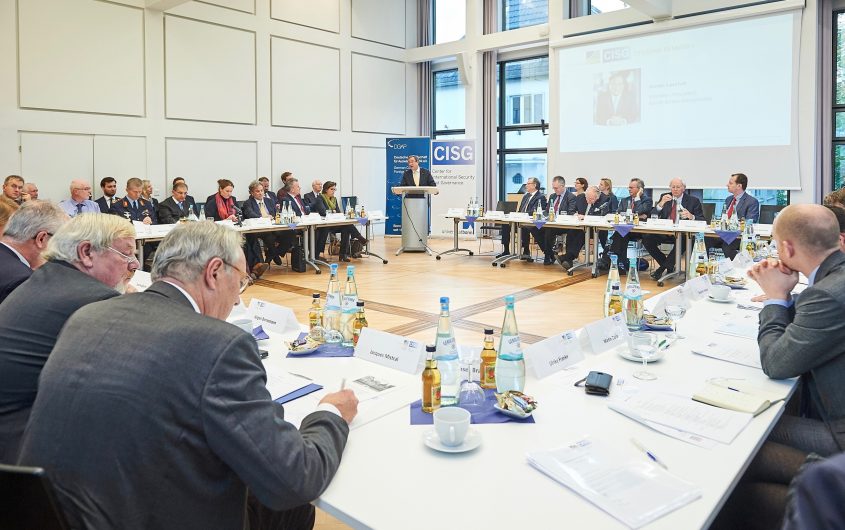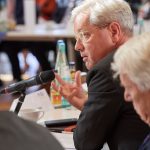
Volker Lannert
Unravelling Order, Uncertain Future? – The International System and Transatlantic Relations in Transition
International Security Forum 2017
Uncertainty marks the present and future of European and transatlantic security. What kind of world order will emerge from the current crisis of liberal multilateralism? Can Europe and the U.S. move forward together in spite of major internal conflict? American and European experts and practitioners of foreign and security policy convened on October 25, 2017, in Bonn for the second International Security Forum to discuss these and other pressing issues in international affairs. Current and former staff of the German and American foreign and defense ministries, members of German, French, Hungarian, American, and Russian research institutions as well as German policymakers on the regional and national level debated the future of German and American security policy and its repercussions for an international order in three lively sessions.
Are we living in the final days of the liberal order, or is our current system more resilient than doomsayers suggest? While some experts at the Forum viewed reduced American engagement in world affairs as a potential trigger for a transformation toward unilateralism and protectionism, others maintained that the institutions and rules embodying liberal multilateralism are tried and tested enough to withstand current pressures. Other participants likened the current state of the international order to a driving car with a cracked windshield: a fully functional construction whose entire structural integrity could fail if a major shock occurred. And crises with potential for escalation are manifold: from North Korea to Iran or the Middle East, the stability of several world regions is currently at a tipping point.
Participants agreed: in such uncertain times, resilience is key. Not all risks and threats can be deterred or managed, so the ability to absorb shocks and respond to crises, be they economic, political, or military, is more important than ever. The gradual withdrawal of the U.S. under President Trump from the world stage means that Europe, in particular, will have to enhance its capabilities for international engagement. No matter how successful a leader Europe might become in international affairs, however, the maintenance of a peaceful international order will continue to depend on the U.S. – for better or for worse.
So what can and must Europe do next? European security and defense policy remain in dire need of reform, although recent advances in European defense cooperation, which attracted much attention throughout the Forum, might just ring in a new chapter in regional integration. Still, not all rhetoric becomes a reality, and long-standing obstacles such as diverging strategic priorities or preferences for national over regional defense will have to be addressed in the near future. While Europe’s material capabilities must be enhanced to lend the continent geopolitical weight and credibility as an international leader, a common defense policy, however difficult it may be to achieve, might be just as important for greater European autonomy and unity in international relations.
All participants stressed that the U.S. would nevertheless remain indispensable for European security. As a consequence, several experts suggested that Europe – and Germany in particular – would be well-advised to make itself an indispensable ally to its American partner, emphasizing that more integrated European defense policies and structures should still be fully complementary to NATO. Other proposals proved to be more controversial. Above all, the 2 percent defense spending target remains a point of contention between Europe and the U.S. While Americans underlined that the call for greater European defense spending is near-ubiquitous among U.S. policymakers, Europeans suggested that the American leadership should perhaps adopt a more differentiated understanding of defense spending.
Ongoing crises as well as longer-term power shifts, especially towards the Asia-Pacific, render the necessity for a strong transatlantic security partnership with a strengthened European pole all the more apparent. Experts’ advice at the Bonn International Security Forum is clear: If Europe and the U.S. want to preserve the cornerstones of the liberal order of the past decades, both will have to shoulder greater individual responsibility, become more creative in addressing global crises, and adapt the transatlantic alliance to sustain it for the future.
Comments and Perspectives
Prof. James D. Bindenagel: Germany’s International Responsibility
Dr. Jackson Janes: Transatlantic Stress Tests
Prof. James Goldgeier: How Strong is the United States Commitment to NATO
Kim R. Holmes: Coping with a Transatlantic Relationship in Flux
Anna Maria Kellner: The EU Global Strategy: From Ambition to Implementation
Colonel Martin Krüger: The Future of German National Security and Defense
Prof. Dr. Holger Mey: European Defense Industries – which Future?
Dr. Jana Puglierin: A Superhero Without Superpowers? Germany and its “Spider-Man Doctrine”
Kori Schake: The Demise of Multilateralism Is Overstated
Dr. Klaus Scharioth: President Trump’s Security Policy
Dr. Christoph Schwegmann: Germany’s Contribution and Perspective on the Future of World Order
Photos from the event:
All photos: Volker Lannert

















